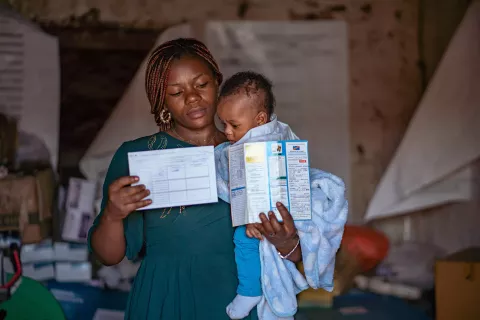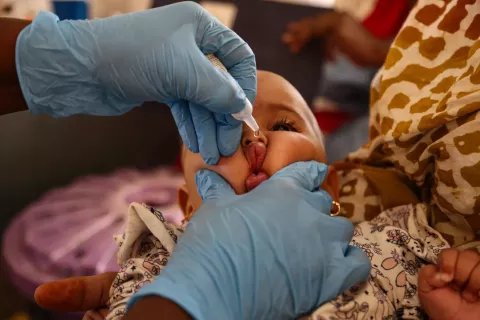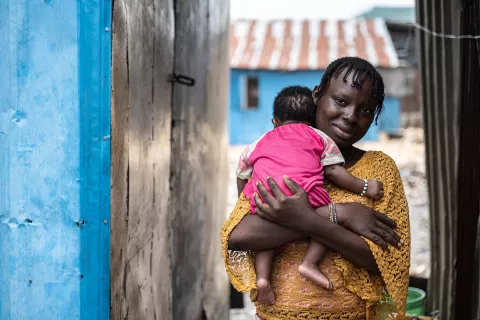The Golden Girls of Nigeria
Inspiring Young Girls in Tech

ABUJA, Nigeria, 26 September 2018 – Today's generation of girls are preparing to enter a world of work that is being transformed by innovation and automation. Of the 1 billion young people – including 600 million adolescent girls – who will enter the workforce in the next decade, more than 90 per cent of those living in developing countries will work in the informal sector, where low or no pay, abuse and exploitation are common.
Restricted digital connection and cultural biases are some of the issues that limit girls’ participation in technology. But this did not hold back these five young Nigerian girls who have made their way into Silicon Valley’s hall of fame.

"We felt fulfilled winning this competition. At last, we created something to solve a problem that can save lives in my country. We are very happy."
Hailing from Anambra State in southeastern Nigeria, schoolgirls - Promise Nnalue, Jessica Osita, Nwabuka Ossai, Adaeze Onuigbo and Vivian Okoye, spent months learning how to use open-source software to build mobile applications. The girls decided to build an app to revolutionize their country’s health care system and address the problem of counterfeit pharmaceutical products rampant in the Nigerian market. Their app, called the FD Detector (Fake Drug Detector), was presented at the 2018 Technovation World Pitch in the US - the world’s largest tech entrepreneurship event for girls. The girls went on to win gold at the competition, ahead of teams from the US, Spain, Turkey, Uzbekistan and China, and have now been dubbed the ‘Golden Girls’.
Their win has brought to light the important contribution girls can make to technology and the need for investing in girls’ education, especially in science, technology, engineering and mathematics (STEM). In a country where there is a belief that boys perform better than girls in STEM and other cultural factors affect the entrance of girls in this field, it is imperative for government, teachers and families to put more effort into encouraging girls’ participation in STEM.
“We felt fulfilled winning this competition. At last, we created something to solve a problem that can save lives in my country. We are very happy,” said a beaming Promise, 14, one of the schoolgirls. For Osita, another teammate, creating the FD Detector was more personal – her brother died from taking fake drugs.

The girls, who are junior secondary school students at Regina Pacis Model School, are planning to partner with Nigeria’s food and drug regulator, the National Agency for Food and Drug Administration and Control (NAFDAC), to create a database of certified pharmaceutical products. Their app will enable anyone with a smartphone camera to scan the barcode of a drug and ascertain the authenticity of the product. The girls have big dreams to inspire other Nigerian girls to participate in technology. For them, winning gold is just the beginning.
To give the girls a platform to inspire thousands of other girls across Nigeria, UNICEF Nigeria organized a Live Chat event via U-Report, a social monitoring tool for community participation with over 2.6 million registered members in Nigeria. Over 7,000 questions were submitted from participants across Nigeria, and the girls had a chance to interact with other girls one-on-one. Their mentor, Uchenna Onwuamaegbu-Ugwu, whose work is focused on implementing STEM education in schools for children, was also on ground to guide the girls as they engaged with U-reporters.
“It’s so exciting to see these girls share their journey with many other girls who want to do amazing things. It’s inspiring and will help other girls believe they can fulfill their dreams – no matter how big they are,” said Caroline Muhwezi, U-report Officer at UNICEF Nigeria.
“Their hard work, persistence, and drive is an example and inspiration for Nigerian girls – and girls around the world,” echoed Pernille Ironside, Deputy Representative at UNICEF Nigeria, congratulating the award-winning girls. “It is girls like them who can be the agents of change in schools and communities, and set the world on a path where every child can be safe, healthy and happy – and free to fulfill their dreams."
UNICEF continues to work to promote girls’ education and participation in STEM. On 11 October, International Day of the Girl, we are working alongside girls to expand existing learning opportunities and are calling on the global community to rethink how to prepare young people – especially girls – for a successful transition into the world of work.




